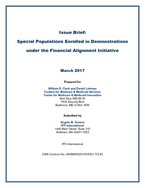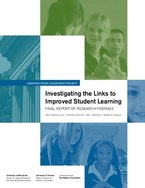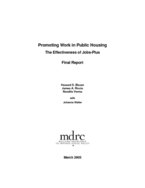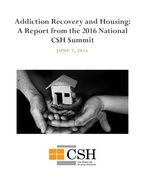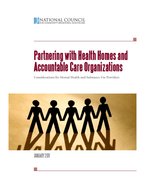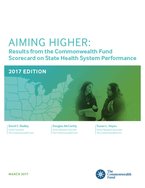0
Report
Community:
Jul 18, 2018
This Issue Brief provides an update on the beneficiary experience in the first two demonstrations that were implemented as part of the Centers for Medicare & Medicaid Services (CMS) Financial Alignment Initiative to test integrated care and financing models for Medicare-Medicaid enrollees. The Washington Health Homes MFFS demonstration, a managed fee-forservice model demonstration, and the Massachusetts One Care demonstration, a capitated model demonstration, began operations on July 1st and October 1st of 2013, respectively.
For the purposes of this report, special populations encompass the following: (1) enrollees who use long-term services and supports (LTSS) which include nursing facilities, personal care services, residential care facilities, and adult day care; (2) enrollees with behavioral health needs, including those with serious and persistent mental illness (SPMI) such as schizophrenia and bipolar disorder; and (3) linguistic, ethnic, and racial minorities enrolled in the demonstrations. The purpose of this brief is to report how enrollees who use these services are faring under the Washington and Massachusetts demonstrations and to understand if disparities in services and demonstration experiences exist for these groups.
Authored by:
Topics: East Coast, Health, Healthy homes, Immigrants, Low-income, Medicaid / Medicare, Pacific Northwest, Partnerships, Racial inequalities, Research
 Shared by Housing Is
Shared by Housing Is
Housing Is posted a
on Jul 18, 2018
This Issue Brief provides an update on the beneficiary experience in the first two demonstrations that were implemented as part of the Centers for Medicare & Medicaid Services (CMS) Financial Alignment Initiative to test integrated care and financing models for Medicare-Medicaid enrollees.
0
Report
Community:
Jul 18, 2018
This Issue Brief describes the results of focus groups conducted in six States as part of the Centers for Medicare & Medicaid Services Financial Alignment Initiative to test integrated care and financing models for Medicare-Medicaid enrollees. Five of these States—California, Illinois, Massachusetts, Ohio, and Virginia—are implementing a capitated model demonstration in which Medicare-Medicaid Plans (MMPs) provide coordinated benefits and access to new and flexible services through a person-centered care model. One, Washington, is implementing a managed fee-for-service model demonstration in which health homes are responsible for organizing enhanced integration of primary, acute, behavioral, and long-term services and supports across existing delivery systems for Medicare-Medicaid enrollees and for directing person-centered care for high-cost, high-risk enrollees.
Authored by:
Topics: Cost effectiveness, Health, Healthy homes, Low-income, Medicaid / Medicare, Partnerships, Racial inequalities, Research
 Shared by Housing Is
Shared by Housing Is
Housing Is posted a
on Jul 18, 2018
This Issue Brief describes the results of focus groups conducted in six States as part of the Centers for Medicare & Medicaid Services Financial Alignment Initiative to test integrated care and financing models for Medicare-Medicaid enrollees.
0
Report
Community:
Jul 17, 2018
This final report on MDRC’s evaluation of Jobs-Plus describes the program’s impacts, that is, the difference it made for residents in Jobs-Plus developments in comparison with residents living in similar developments who did not receive the program. These findings offer important lessons to policymakers and program administrators about how to increase the economic self-sufficiency of public housing residents.
Authored by:
Topics: Asset building, Community development, Cost effectiveness, Legislation & Policy, Metrics, Research, Workforce development
 Shared by Housing Is
Shared by Housing Is
Housing Is posted a
on Jul 17, 2018
This final report on MDRC’s evaluation of Jobs-Plus describes the program’s impacts, that is, the difference it made for residents in Jobs-Plus developments in comparison with residents living in similar developments who did not receive the program.
0
Report
Community:
Jul 13, 2018
This document highlights actions states and other entities have taken to improve service delivery and financing of the services delivered by supportive housing providers.
Authored by:
Topics: Health, Housing, Low-income, Medicaid / Medicare, Partnerships
 Shared by Housing Is
Shared by Housing Is
Housing Is posted a
on Jul 13, 2018
This document highlights actions states and other entities have taken to improve service delivery and financing of the services delivered by supportive housing providers.
0
Report
Community:
Jul 12, 2018
The structure of the evaluation is designed around several research domains that, together, provide a comprehensive assessment of the Community-based Care Transitions Program. The research concentrates on the following areas:
• Program Implementation/Operational Issues.
• Beneficiary Participation.
• Provider Participation.
• Utilization and Readmissions.
• Costs/Savings.
• Quality Monitoring and Quality Improvement.
• Unintended Consequences.
Authored by:
Topics: Cost effectiveness, Data sharing, Health, Low-income, Medicaid / Medicare, Partnerships, Seniors
 Shared by Housing Is
Shared by Housing Is
Housing Is posted a
on Jul 12, 2018
The structure of the evaluation is designed around several research domains that, together, provide a comprehensive assessment of the Community-based Care Transitions Program. The research concentrates on the following areas:
• Program Implementation/Operational Issues.
0
Report
Community:
Jul 12, 2018
We examined the influence of maternal health literacy on child participation in social welfare programs. In this cohort, 20% of the mothers had inadequate or marginal health literacy. Initially, more than 50% of the families participated in Temporary Assistance for Needy Families (TANF), the Food Stamp Program, and Special Supplemental Nutrition Program for Women, Infants, and Children, whereas fewer than 15% received child care subsidies or public housing. In multivariate regression, TANF participation was more than twice as common among children whose mothers had adequate health literacy compared with children whose mothers had inadequate health literacy
Authored by:
Topics: Child welfare, Dual-generation, Early childhood, Education, Family engagement, Food insecurity, Health, Housing, Low-income, Medicaid / Medicare, Nutrition, Pre-natal, Preventative care, Research, Stability
 Shared by Housing Is
Shared by Housing Is
Housing Is posted a
on Jul 12, 2018
We examined the influence of maternal health literacy on child participation in social welfare programs. In this cohort, 20% of the mothers had inadequate or marginal health literacy.
0
Report
Community:
Jul 12, 2018
This article deconstructs the history, structure, and financing that have made this unique partnership between Philadelphia's Department of Behavioral Health and Intellectual Disabilities, the Office of Homeless Services, and the Housing Authority, possible.
Authored by:
Topics: Data sharing, Disabilities, Dual-eligibles, Health, Housing, Legislation & Policy, Low-income, Medicaid / Medicare, Mental health, Partnerships, Preventative care, Research, Supportive housing
 Shared by Housing Is
Shared by Housing Is
Housing Is posted a
on Jul 12, 2018
This article deconstructs the history, structure, and financing that have made this unique partnership between Philadelphia's Department of Behavioral Health and Intellectual Disabilities, the Office of Homeless Services, and the Housing Authority, possible.
0
Report
Community:
Jul 12, 2018
On June 7, 2016 CSH invited a diverse group of national experts from the housing, homeless prevention, Substance Use Disorder (SUD) treatment, mental health, criminal justice and recovery fields for a special meeting on the topic of addiction recovery and housing. The primary goal of the convening was to engage participants in a thoughtful discussion around how CSH can work with our national and local partners to promote recovery in supportive housing and ensure that supportive housing is part of the continuum of recovery supports available for people living with addiction.
Authored by:
Topics: Criminal justice, Dual-eligibles, Health, Homelessness, Housing, Legislation & Policy, Mental health, Partnerships, Substance abuse, Supportive housing
 Shared by Housing Is
Shared by Housing Is
Housing Is posted a
on Jul 12, 2018
On June 7, 2016 CSH invited a diverse group of national experts from the housing, homeless prevention, Substance Use Disorder (SUD) treatment, mental health, criminal justice and recovery fields for a special meeting on the topic of addiction recovery and housing.
0
Report
Community:
Jul 12, 2018
Considerations for Mental Health and Substance Use Providers
Authored by:
Topics: Affordable Care Act, Health, Healthy homes, Legislation & Policy, Low-income, Medicaid / Medicare, Partnerships
 Shared by Housing Is
Shared by Housing Is
Housing Is posted a
on Jul 12, 2018
Considerations for Mental Health and Substance Use Providers
0
Report
Community:
Jul 11, 2018
To help inform policymakers and move policy forward, this paper discusses the current state of housing in the United States, provides a conceptual framework for housing as a platform to improve educational outcomes for children, reviews the existing evidence that supports conceptual models, and identifies the major gaps in research. Finally, it proposes a list of projects that make up a research agenda for understanding the issue and guiding investments in new research.
Authored by:
Topics: Attendance, Child welfare, Early childhood, Education, Housing, Literacy, Low-income, Mental health, Post-secondary, Preventative care, Racial inequalities, Research, Safety, Stability, Youth
 Shared by Housing Is
Shared by Housing Is
Housing Is posted a
on Jul 11, 2018
To help inform policymakers and move policy forward, this paper discusses the current state of housing in the United States, provides a conceptual framework for housing as a platform to improve educational outcomes for children, reviews the existing evidence that supports conceptual models, and iden
0
Report
Community:
Jul 11, 2018
The 2017 edition of the Commonwealth Fund Scorecard on State Health System Performance finds that nearly all state health systems improved on a broad array of health indicators between 2013 and 2015. During this period, which coincides with implementation of the Affordable Care Act’s major coverage expansions, uninsured rates dropped and more people were able to access needed care, particularly those in states that expanded their Medicaid programs. On a less positive note, between 2011–12 and 2013–14, premature death rates rose slightly following a long decline. The Scorecard points to a constant give-and-take in efforts to improve health and health care, reminding us that there is still more to be done.
Authored by:
Topics: Affordable Care Act, Cost effectiveness, Health, Legislation & Policy, Low-income, Medicaid / Medicare, Preventative care, Racial inequalities, Research
 Shared by Housing Is
Shared by Housing Is
Housing Is posted a
on Jul 11, 2018
The 2017 edition of the Commonwealth Fund Scorecard on State Health System Performance finds that nearly all state health systems improved on a broad array of health indicators between 2013 and 2015.
0
Report
Community:
Jul 10, 2018
In December 2016, federal and state policymakers examined the intersection of unstable housing and negative health outcomes at a meeting convened in Washington, D.C., by the National Academy for State Health Policy (NASHP) with support from The Commonwealth Fund. The goal of the meeting was to identify concrete policy recommendations and actionable steps to align health and housing programs to ensure that people with high service needs receive the housing and supportive services they need to become and stay healthy. This report summarizes their findings and recommendations.
Authored by:
Topics: Child welfare, Cost effectiveness, Data sharing, Disabilities, Dual-generation, Health, Homelessness, Housing, Legislation & Policy, Low-income, Medicaid / Medicare, Partnerships, Seniors, Supportive housing
 Shared by Housing Is
Shared by Housing Is
Housing Is posted a
on Jul 10, 2018
In December 2016, federal and state policymakers examined the intersection of unstable housing and negative health outcomes at a meeting convened in Washington, D.C., by the National Academy for State Health Policy (NASHP) with support from The Commonwealth Fund.
0
Report
Community:
Jul 10, 2018
HUD Administrative Data Linked with the National Health Interview Survey
Authored by:
Topics: Attendance, Child welfare, Data sharing, Dental, Health, Housing, Low-income, Medicaid / Medicare, Mental health, Metrics, Racial inequalities, Vision
 Shared by Housing Is
Shared by Housing Is
Housing Is posted a
on Jul 10, 2018
HUD Administrative Data Linked with the National Health Interview Survey
0
Report
Community:
Sep 1, 2017
A Snapshot of Housing Affordability for Healthcare Workers
Authored by: Kaitlyn Snyder and Janet Viveiros for National Housing Conference
Topics: Health, Healthy homes, Home visiting, Housing, Legislation & Policy, Low-income
 Shared by Housing Is
Shared by Housing Is
Housing Is posted a
on Jul 5, 2018
Kaitlyn Snyder and Janet Viveiros for National Housing Conference
A Snapshot of Housing Affordability for Healthcare Workers
0
Report
Community:
Dec 6, 2017
It adds to the growing body of evidence that addressing homelessness saves money elsewhere.
Authored by: J.B. Wogan for Governing the States and Localities
Topics: Cost effectiveness, Criminal justice, Health, Healthy homes, Homelessness, Housing, Legislation & Policy, Place-based, Preventative care, Research, Stability, West Coast
 Shared by Housing Is
Shared by Housing Is
Housing Is posted a
on Jul 5, 2018
J.B. Wogan for Governing the States and Localities
It adds to the growing body of evidence that addressing homelessness saves money elsewhere.
0
Video
Community:
Dec 12, 2017
In a new three-part video series, the American Council for an Energy-Efficient Economy explores how energy efficiency can improve people’s health. We hear the stories of homeowners in three states. To look at efficiency’s impact in rural areas, Part One takes us to McDowell County, West Virginia.
Authored by: Sarah Hayes for the American Council on an Energy-Efficient Economy
Topics: Asthma, Energy, Green, Health, Healthy homes, Housing, Place-based, Safety, Seniors, Sustainability
 Shared by Housing Is
Shared by Housing Is
Housing Is posted a
on Jul 5, 2018
Sarah Hayes for the American Council on an Energy-Efficient Economy
In a new three-part video series, the American Council for an Energy-Efficient Economy explores how energy efficiency can improve people’s health. We hear the stories of homeowners in three states. To look at efficiency’s impact in rural areas, Part One takes us to McDowell County, West Virginia.
0
Report
Community:
Jun 1, 2017
Over the past year, the United States Conference of Mayors and the Brookings Institution, along with the Project for Public Spaces have worked together to capture a new model of growth that is emerging in cities and the particular roles that mayors can play.
Authored by: Julie Wagner, Jennifer S. Vey, Steve Davies, and Nathan Storring for Brookings Institute
Topics: Asset building, Community development, Cost effectiveness, Funding, Legislation & Policy, Place-based, Research
 Shared by Housing Is
Shared by Housing Is
Housing Is posted a
on Jul 5, 2018
Julie Wagner, Jennifer S. Vey, Steve Davies, and Nathan Storring for Brookings Institute
Over the past year, the United States Conference of Mayors and the Brookings Institution, along with the Project for Public Spaces have worked together to capture a new model of growth that is emerging in cities and the particular roles that mayors can play.
0
Report
Community:
Mar 6, 2018
MDRC, a nonprofit, nonpartisan education and social policy research firm, released encouraging results from a demonstration, funded by Robin Hood, of two aligned interventions in New York City.
Authored by: MDRC
Topics: Early childhood, Education, Grade-level proficiency, Low-income, Metrics, Racial inequalities, Research, Youth
 Shared by Housing Is
Shared by Housing Is
Housing Is posted a
on Jul 5, 2018
MDRC, a nonprofit, nonpartisan education and social policy research firm, released encouraging results from a demonstration, funded by Robin Hood, of two aligned interventions in New York City.
0
Report
Community:
Jun 29, 2017
Violent-crime arrests drop by 33 percent for program participants.
Authored by: UChicago News
Topics: Child welfare, Criminal justice, Education, Low-income, Midwest, Mobility, Out-of-school time, Post-secondary, Racial inequalities, Research, Safety, Substance abuse, Workforce development, Youth
 Shared by Housing Is
Shared by Housing Is
Housing Is posted a
on Jul 5, 2018
Violent-crime arrests drop by 33 percent for program participants.
0
Report
Community:
Nov 1, 2017
Why do some neighborhoods appear able to launch effective local improvement initiatives, while others are more hampered by fragmentation and mistrust? Why can some communities mobilize diverse constituencies to influence public policy, while others cannot? Answers to these questions may be found in the specific patterns of collaboration that form among community organizations, and between these groups, schools, public agencies, and elected officials, according to MDRC, a preeminent social-policy research organization.
Authored by: MDRC
Topics: Asset building, Child welfare, Community development, Data sharing, Dual-generation, Education, Family engagement, Funding, Health, Housing, Legislation & Policy, Low-income, Metrics, Midwest, Mobility, Out-of-school time, Partnerships, Place-based, Preventative care, Research, Safety, Stability, Workforce development, Youth
 Shared by Mica O'Brien
Shared by Mica O'Brien
Mica O'Brien posted a
on Jun 29, 2018
Why do some neighborhoods appear able to launch effective local improvement initiatives, while others are more hampered by fragmentation and mistrust? Why can some communities mobilize diverse constituencies to influence public policy, while others cannot?
1
Video
Community:
May 23, 2018
The Council of Large Public Housing Authorities (CLPHA) hosted The Housing Is Summit in Washington, D.C., on May 3-4, 2018 with 300 partners across the housing, education, and healthcare sectors. Access video recordings of the Summit's keynote speakers (HUD Secretary Ben Carson, John Bridgeland, Matthew Morton), plenary panels (on topics that cut across sectors like anchor institutions, data collaboration, stability, and foundation investments), and select breakout sessions focused on the intersections of housing, education, and health.
Authored by: Council of Large Public Housing Authorities
Topics: Affordable Care Act, Attendance, Child welfare, CLPHA, Community development, Data sharing, Dual-eligibles, Dual-generation, Early childhood, Education, Funding, Grade-level proficiency, Health, Healthy homes, Homelessness, Housing, Legislation & Policy, Low-income, Medicaid / Medicare, Mental health, Metrics, MTW, Out-of-school time, Partnerships, Place-based, Preventative care, Racial inequalities, Research, School-readiness, Seniors, Stability, Substance abuse, Supportive housing, Sustainability, TA, Workforce development, Youth
 Shared by Steve Lucas
Shared by Steve Lucas
Steve Lucas posted a
on May 23, 2018
The Council of Large Public Housing Authorities (CLPHA) hosted The Housing Is Summit in Washington, D.C., on May 3-4, 2018 with 200 partners across the housing, education, and healthcare sectors. The Summit highlighted the ways that we can transform systems to better serve low-income people with two days of plenary speakers/panels, breakout sessions, and caucus discussions geared toward intersectional thinking and ways to take action.
Council of Large Public Housing Authorities
The Council of Large Public Housing Authorities (CLPHA) hosted The Housing Is Summit in Washington, D.C., on May 3-4, 2018 with 300 partners across the housing, education, and healthcare sectors.
0
Video
Community:
Jan 8, 2018
Increasingly, a wide range of entities—housers, educators, cities—are using data sharing as a way to increase effectiveness across systems. Data sharing exemplifies this community of practice’s intent to align systems to improve life outcomes for low-income children. We have many robust examples on the local level and this panel will discuss what data systems beyond local partners can look like and accomplish.
Dennis Culhane, Co-Principal Investigator, Actionable Intelligence for Social Policy, University of Pennsylvania School of Social Policy & Practice
Authored by: CLPHA
Topics: Asset building, CLPHA, Data sharing, Education, Housing, Low-income, Metrics, Partnerships, Research
 Shared by CLPHA Admin
Shared by CLPHA Admin
CLPHA Admin posted a
on Jan 8, 2018
Increasingly, a wide range of entities—housers, educators, cities—are using data sharing as a way to increase effectiveness across systems. Data sharing exemplifies this community of practice’s intent to align systems to improve life outcomes for low-income children.
0
Video
Community:
Jan 8, 2018
This panel provides updates on the future of ConnectHome, the program’s partnership with Google Fiber, and what’s next for using data to assess the program, as well as lessons learned from Google Fiber’s ambitious initiative to provide free high-speed internet to housing authority residents.
Calvin Johnson, Deputy Assistant Secretary, U.S. Department of Housing and Urban Development
Erica Swanson, Head of Community Impact Programs, Google Fiber
Authored by: CLPHA
Topics: Broadband, CLPHA, Education, Low-income
 Shared by CLPHA Admin
Shared by CLPHA Admin
CLPHA Admin posted a
on Jan 8, 2018
This panel provides updates on the future of ConnectHome, the program’s partnership with Google Fiber, and what’s next for using data to assess the program, as well as lessons learned from Google Fiber’s ambitious initiative to provide free high-speed internet to housing authority residents.
Calvin
0
Video
Community:
Jan 3, 2018
Anchor institutions can provide invaluable expertise, as well as serve as reliable third party entities, especially in our resource-constrained environment. Chicago Housing Authority and the University of Chicago describe how their partnership has increased their efforts and made it more efficient.
Cassandra Brooks, Education Specialist, Chicago Housing Authority
Denali Dasgupta, Researcher, Chapin Hall, University of Chicago
Nick Mader, Senior Researcher, Chapin Hall, University of Chicago
Authored by: CLPHA
Topics: CLPHA, Education, Housing, Low-income, Midwest, Partnerships, Place-based, Research, Stability
 Shared by CLPHA Admin
Shared by CLPHA Admin
CLPHA Admin posted a
on Jan 3, 2018
Anchor institutions can provide invaluable expertise, as well as serve as reliable third party entities, especially in our resource-constrained environment.
0
Video
Community:
Dec 22, 2017
James Cole, Jr., U.S. Department of Education General Counsel/Delegated the Duties of Deputy Secretary, gives a keynote speech at CLPHA's 2016 Affordable Housing & Education Summit.
Authored by: CLPHA
Topics: CLPHA, Education, Housing, Legislation & Policy, Partnerships
 Shared by CLPHA Admin
Shared by CLPHA Admin
CLPHA Admin posted a
on Dec 22, 2017
James Cole, Jr., U.S. Department of Education General Counsel/Delegated the Duties of Deputy Secretary, gives a keynote speech at CLPHA's 2016 Affordable Housing & Education Summit.
 Shared by Housing Is
on Jul 18, 2018
Shared by Housing Is
on Jul 18, 2018
 Shared by Housing Is
on Jul 18, 2018
Shared by Housing Is
on Jul 18, 2018
 Shared by Housing Is
on Jul 17, 2018
Shared by Housing Is
on Jul 17, 2018
 Shared by Housing Is
on Jul 13, 2018
Shared by Housing Is
on Jul 13, 2018
 Shared by Housing Is
on Jul 12, 2018
Shared by Housing Is
on Jul 12, 2018
 Shared by Housing Is
on Jul 12, 2018
Shared by Housing Is
on Jul 12, 2018
 Shared by Housing Is
on Jul 12, 2018
Shared by Housing Is
on Jul 12, 2018
 Shared by Housing Is
on Jul 12, 2018
Shared by Housing Is
on Jul 12, 2018
 Shared by Housing Is
on Jul 12, 2018
Shared by Housing Is
on Jul 12, 2018
 Shared by Housing Is
on Jul 11, 2018
Shared by Housing Is
on Jul 11, 2018
 Shared by Housing Is
on Jul 11, 2018
Shared by Housing Is
on Jul 11, 2018
 Shared by Housing Is
on Jul 10, 2018
Shared by Housing Is
on Jul 10, 2018
 Shared by Housing Is
on Jul 10, 2018
Shared by Housing Is
on Jul 10, 2018
 Shared by Housing Is
on Jul 5, 2018
Shared by Housing Is
on Jul 5, 2018

 Shared by Housing Is
on Jul 5, 2018
Shared by Housing Is
on Jul 5, 2018

 Shared by Housing Is
on Jul 5, 2018
Shared by Housing Is
on Jul 5, 2018
 Shared by Housing Is
on Jul 5, 2018
Shared by Housing Is
on Jul 5, 2018
 Shared by Housing Is
on Jul 5, 2018
Shared by Housing Is
on Jul 5, 2018

 Shared by Housing Is
on Jul 5, 2018
Shared by Housing Is
on Jul 5, 2018



 Shared by Steve Lucas
on May 23, 2018
Shared by Steve Lucas
on May 23, 2018
 Shared by CLPHA Admin
on Jan 8, 2018
Shared by CLPHA Admin
on Jan 8, 2018
 Shared by CLPHA Admin
on Jan 8, 2018
Shared by CLPHA Admin
on Jan 8, 2018
 Shared by CLPHA Admin
on Jan 3, 2018
Shared by CLPHA Admin
on Jan 3, 2018
 Shared by CLPHA Admin
on Dec 22, 2017
Shared by CLPHA Admin
on Dec 22, 2017




